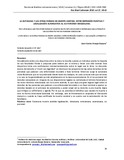La Eutanasia y las otras formas de Muerte Asistida: Entre Represión Punitiva y Legalización Alternativa al IUS Puniendi Venezolano.
Fecha
2018-03Palabras Clave
Eutanasia muerte asistida legalización, Distanasia, Cacotanasia, Ius puniendiEuthanasia assisted death legalization, Disthanasia, Ortotanasia, Cacotanasia, Ius puniendi
Metadatos
Mostrar el registro completo del ítemResumen
Actualmente existe una disyuntiva entre la vida y la muerte cuando un individuo pierde la mayoría de sus facultades fisicas o psiquicas para valerse por sí misma y llevar una vida normal. Esta disyuntiva inicia una confrotacion inmisericordemente entre lo legal con lo ético. La discusión acerca del derecho a “morir con dignidad” se retoma en los proyectos de ley sobre derechos de las personas que padecen una enfermedad incurable o fase terminal. Entonces surge la eutanasia como fenómeno que se ha practicado desde todos los tiempos, en unas culturas más que en otras y su uso se ha generalizado ya más ampliamente en la época posmoderna. En el ius puniendi del derecho venezolano en ninguna de sus disposiciones legales se contempla el término Eutanasia o los otros términos relacionado con la muerte asistida, lo que deja una gran laguna legal sobre el derecho de las personas que padecen una enfermedad incurable o en fase terminal a ejercer su derecho basado en el principio de autonomía, y poder exigir así su derecho a una muerte digna que mitigue su sufrimiento u agonía. Por lo que se, penaliza al individuo que causare la muerte a otro de forma intencional (asistida). Sin embargo, solo la Ortotanasia es aceptada en Venezuela siempre y cuando se haya certificado la muerte cerebral y se cuente con la autorización de los familiares.
Información Adicional
| Otros Títulos | The Euthanasia and the other Forms of Assisted Death: Between Punitive Repression and Alternative Legalization to the IUS Puniendi Venezolano. - A Eutanásia e as outras formas de Morte Assistida: Entre Repressão Punitiva e Legalização Alternativa para o IUS Puniendi Venezolano. |
| Correo Electrónico | jcaraujoc_65@hotmail.com; jcaraujoc95@gmail.com |
| ISSN | 2244-7482 |
| Resumen en otro Idioma | Currently, there is a trade-off between life and death when an individual loses most of its physical or psychic abilities to fend for itself and lead a normal life. This dilemma starts a confrotacion mercilessly between what is legal with ethics. The discussion about the right to "dying with dignity" was taken up in the draft law on the rights of persons suffering from an incurable disease or terminal phase. Then there is the euthanasia as a phenomenon that has been practiced since the beginning of time, in some cultures more than others, and their use has become more widespread as more widely in the post-modern epoch. n the ius puniendi Venezuelan law in any of its legal provisions provided for the term euthanasia or the other terms related to assisted death, which leaves a large loophole on the right of the people suffering from an incurable disease or terminal to exercise their right, based on the principle of autonomy, and be able to demand their right to a dignified death to mitigate their suffering or agony. As far as I know, penalizes the individual who causes the death of another intentionally (power-assisted steering). However, only the Ortotanasia is accepted in Venezuela has been certified as brain dead and with the permission of the family. |
| Colación | 38-65 |
| Periodicidad | semestral |
| País | Venezuela |
| Publicación Electrónica | Revista de Bioética Latinoamericana |
| Sección | Revista de Bioética Latinoamericana: Artículos |






